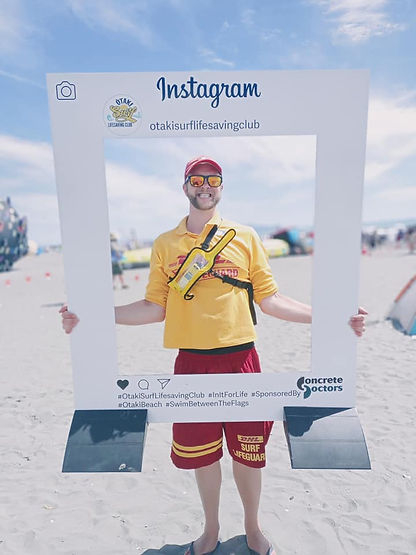
CLUB HISTORY
DANGER PERCEIVED
Because of the perceived danger to swimmers, several attempts were made to form a surf lifesaving club. Ōtaki Borough Council tried in 1922 and a reel and line were donated. In 1924 W H Wills, principal of the Ōtaki Maori Boys College commented that the active club members were college boys and it was a pity others in the community did not take more interest. In September 1927 the Ōtaki Mail thought “it won’t be long before Ōtaki once again has a team on the beach", but it didn’t happen. February 1931 saw a new club formed, taking over the assets of the old one, but it was the Depression and when summer 1932 ended, so did the club. Finally, in 1939 the club reformed but war was declared and men were needed overseas.


A CLUB IS BORN
The club was reformed late in 1953 and operated out of the beach pavilion. However it soon became clear that rooms of our own were urgently needed, and in August 1955 we began negotiations with the Ōtaki Borough Council to lease land to the north of the Marine Pavilion.
A gear shed with a look-out tower, and a separate changing room, was in use by the end of 1957, the building having cost a total of £2700. By the end of 1959, it was felt that a large hall with a kitchen should also be included and this became a much-used facility, with improvements and extensions made over the years.
LADIES WELCOME
After much discussion, we followed a nationwide trend and it was agreed that females could train to become lifeguards and the rules were changed in 1974 to officially allow this to happen. Some of the first to qualify were (L toR) Jenny Knox, Liz Holmes, Annette Sargisson, Janet Sargisson - see photo adjacent. Now more than half our lifeguards are females.


RESCUE CRAFT
Officially lifeguards patrol the flagged area adjacent to the clubrooms but we are regularly called out to assist people further along the beach. In 1975 the club purchased a jeep to enable us to travel quickly to rescues beyond the patrolled area. In 1977, after a rescue in big seas and high winds, assisted by Mayor Murray Scott in his boat, we purchased our first IRB (inflatable rescue boat). These craft now do a large percentage of rescues in NZ.
PAID LIFEGUARDS
In 1976 the club negotiated with the Ōtaki Borough Council to fund paid lifeguards on the beach on weekdays over the primary school holidays. This service adds to the safety of, and attracts, swimmers and beachgoers to Ōtaki Beach and Kapiti Coast District Council continues to fund the essential service each year.


NATIONAL TITLES
In 1977 Ōtaki won its first National title in the Canoe Rescue. The team was (Standing) Kevin Henry (patient), Mike Holmes (coach), Bill Franklin, (Sitting) Ian Ibbs, Michael Brown (captain), Peter Housiaux.
Since then Otaki has won 18 gold, 22 silver, and 24 bronze medals at the National Championships and has produced two New Zealand representatives – Michael Bassett (three times) and Janene Southgate. Members have also represented New Zealand in other associated water sports – white water and flatwater kayaking, canoe polo, and swimming.
FIRE DESTROYS CLUBROOMS
Around midnight on 9 July 1987 the clubrooms and most of the lifesaving equipment were destroyed by fire. Club members were devastated but were heartened by the immediate and generous support of the community and on 1 August the burnt-out building was demolished and plans and specifications were drawn up. The new building was operational in time for the Central Regional Championships held in February 1988 and attended by over 500 people. More importantly, the club didn’t miss a beat with patrols maintained over the season. The new building was officially opened on 20 November 1988, and a large extension was completed and opened in November 2008.


A THRIVING CLUB
Today the Ōtaki Surf Lifesaving Club continues to grow from strength to strength. Whilst we have performed many rescues in the surf at Ōtaki Beach, our core goal is to perform preventative actions and provide first aid & emergency care. Our lifeguards are also called out for land and sea searches from time to time. They are active in beach education programs with local schools and also give talks/demonstrations to interested groups.